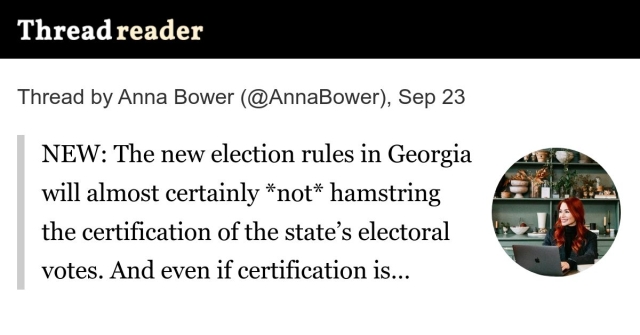Let's hope she's right! That would be a HUGE relief.
Via Anna Bower 🧵 (Thread Reader App):
NEW: The new election rules in #Georgia will almost certainly *not* hamstring the certification of the state’s electoral votes. And even if certification is delayed, such delays do not open up a legal loophole for #Trump to steal the presidency. I explain.
threadreaderapp.com/thread/183…

Thread by @AnnaBower on Thread Reader App
@AnnaBower: NEW: The new election rules in Georgia will almost certainly *not* hamstring the certification of the state’s electoral votes. And even if certification is delayed, such delays do not open up a legal loo...…threadreaderapp.com
Laffy
in reply to Laffy • • •2/ Anna has posted more.
I'll post the rest. Can't remember where they left off but here we go:
Anna:
Of course, even relatively short delays in election result reporting can sow the seeds of doubt. And it’s possible that local officials could use minor discrepancies between the machine tallies and the hand count as pretext to delay certification. Not good.
Laffy
in reply to Laffy • • •3/ Bower:
But (1) Efforts to delay or refuse certification based on minor errors or discrepancies discovered during the reconciliation process would be unlawful, and (2) there is a good chance that the hand count rule actually won’t be in effect at all when the election happens.
Now, I know what you’re thinking. All of this assumes that local officials will actually follow the law.
Laffy
in reply to Laffy • • •4/ Bower:
What happens if they ignore the language in the statute and, pointing to the SEB rules for legal cover, delay or refuse to certify anyway??
Here’s the doomsday scenario: Harris wins Georgia by a razor-thin margin. Local officials in some deep-red counties refuse to certify. As a result, Georgia fails to certify its slate of presidential electors by Dec. 11, the federal deadline. What then?
Laffy
in reply to Laffy • • •5/ Bower:
Well, first, understand that it’s exceedingly unlikely that we’ll even get to the “doomsday scenario” in the first place.
Why? Because there are judicial mechanisms in place to ensure that crucial deadlines can be met even if local officials drag their feet.
Laffy
in reply to Laffy • • •6/ Bower:
If a board refuses to certify its results, the Secretary of State—or another litigant with standing—can sue to force the board to comply with the law. During a briefing last week, Gabriel Sterling said that the Secretary’s office has already game-planned for that scenario.
Yeah, yeah, yeah, courts are slow. But timing shouldn’t be an issue. The relief a litigant would seek to force a county to certify is a “writ of mandamus.” It’s designed to move at judicial warp-speed.
Laffy
in reply to Laffy • • •7/ Bower:
There should be plenty of time to resolve certification disputes by Dec. 11.
But even if certification disputes cause Georgia to blow past the Dec. 11 federal deadline, legislative reforms enacted in the wake of the 2020 election provide for a process to ensure that a single, lawful slate of electors will be counted by Congress on Jan. 6, 2025.
Laffy
in reply to Laffy • • •8/ Bower:
The Electoral Count Reform Act established an expedited procedure to ensure that a state’s failure to certify can be resolved before the Electoral College meets. So if GA fails to certify, Harris could file suit in federal court, with any appeals likely resolved by Dec. 17.
Laffy
in reply to Laffy • • •9/ Bower:
It’s possible that Trump’s allies in Congress could use certification delays as pretext to raise an objection to Georgia’s electoral slate, but the ECRA mitigates those concerns. Rejecting a state’s electoral votes requires a majority of both the House and the Senate
Laffy
in reply to Laffy • • •10/ Bower:
But what if, at the end of the expedited appeals process, Georgia STILL refuses to certify? Would the election be thrown to the House of Representatives under the Twelfth Amendment?
There are political and legal realities that answer or mitigate those concerns, too.
Laffy
in reply to Laffy • • •11/ Bower:
For one thing, the guy in charge of certifying Georgia’s electoral slate is Governor Brian Kemp. If a federal court determines that he should certify Georgia’s electors for Harris, he’s not going to defy that order. It’s just not going to happen.
[Me: If Anna adds more, I will too]
Laffy
in reply to Laffy • • •12/ Bower:
If Kemp were to refuse to certify, that should not trigger the 12th Amendment. Under the ECRA, Congress must remove a state’s electoral votes from what counts as a majority. So a failure to certify would just result in a lessened total # of votes required to win a majority.
Laffy
in reply to Laffy • • •13/ Bower:
I could spend hours responding to the inevitable BUT WHAT IF’s waiting in my replies.
The bottom line is this: The likelihood that a Georgia county board’s refusal to certify could be used to overthrow a presidential election is basically nil—not zero, but approaching zero.